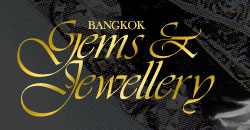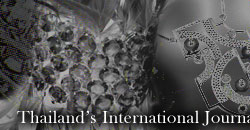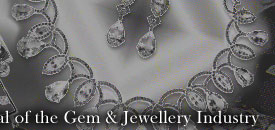| |
|
|
| |
|
 |
| |
|
| |
|
|
|
| |
Australia's
largest diamond was unveiled on August 17 in Darwin. The $1 million,
104.73 carat white diamond has been given an indigenous name in
an Australian first - to preserve its link with its place of origin.
It has been called Jungiila Bunajina, which means "star meteorite
dreaming stone", by the Garrawa and Gurdanji clans. The diamond
was mined on sacred Aboriginal land in the Northern Territory in
March 2002, at the trial Merlin diamond mine about 80km south of
Borroloola.
The mine, which is now destined for closure, was the first to begin
with the agreement of traditional owners under the Native Title
Act. |
|
|
| |
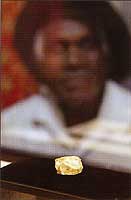 |
Traditional owner Max
Finlay said the stone was of great spiritual significance to the
Aboriginal people, and had brought peace to the two tribes.
"The name Bunajina is a very strong name, it's a name that
ties in ceremony between Gurdanji people and Garrawa people,"
Mr Finlay said. "It's a very sacred area and no-one can go
in there and muck with the area." The name itself was given
because we feel that if we are sharing something with the world,
this is the better way, to try and express our heart to the world.
"Our spirit will always be with that diamond, it's part of
us and for as long as we practise our culture… it will always be
alive. "…The name itself carries the two people." |
|
| |
Mine owner Argyle Diamonds will eventually send the diamond to
Antwerp for evaluation and likely sale. "We don't really
know what's going to happen with the diamond, "Mr Finlay
said. "If it's broken up into thousands of bits of diamond,
it will still have that name, the spiritual name of it will still
exist."
Argyle Diamond's Managing Director Brendan Hammond said the company
had sought an Aboriginal name for the diamond, reflecting its
positive relations with the traditional owners. "The way
that we look at traditional owners is that they are our land owners,
they are our landloads and respect and recognition is absolutely
paramount in terms of our relationship with them, "he said.
The rough diamond was on display in its only Australian showing,
at the Museum and Art Gallery of the NT, until Sunday August 31.

|
|
|
| |
|
|
| |
|
 |
| |
|
| |
|
|
|
|
| |
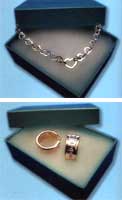 |
To expand its customer
base while maintaining is high class image jewellery retailer Tiffany
& Co will open two new stores this year under the name Temple
St Clair, according to a report in the Wall Street Journal.
Last year Tiffany invested $4 million in the upscale Temple St Clair
line, which produces jewellry that is different from the typical
Tiffany pieces. Earlier this year Tiffany Executive Vice President
James Fernandez, said the company believed certain segments of the
jewellery market were under-penetrated but could not be served effectively
by the Tiffany & Co. brand. |
|
|
| |
The first boutique is slated to open at the South Coast Plaza
in Costa Mesa, California on September 18, and the second at a
shopping centre in Short Hills, New Jersey in November this year.

|
|
|
| |
|
|
| |
|
 |
| |
|
| |
De Beers' Diamond Trading Company (DTC) has announced a price
increase in the Mixed Gem and Mixed Makeable ranges. The increase,
which will take effect from the August sight is the third official
price increase this year. Some argue there was a fourth unofficial
price increase in June. DTC told clients that the overall effect
would be a slight increase which would vary from box to box

|
|
|
| |
|
|
| |
|
 |
|
|
| |
|
|
|
| |
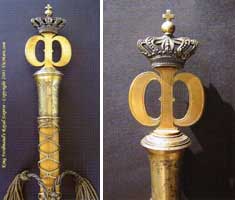
The sceptre of Bulgaria's King Ferdinand I, used
for some ceremonies during the period of 1890 -
1908, is being sold in an Internet sale. The price appionted is $75,000.
Photo by www.vicmart.com
|
The sceptre
of Bulgaria's King Ferdinand I, used for some ceremonies during
the period of 1890-0908, is among a unique collection of royal regalia,
jewellery and military uniforms from Bulgaria's Third Kingdom that
is being sold on the Internet. King Ferdinand did not posses a crown
or orb, since under the Turnovo constitution only an Orthodox Bulgarian
King could receive Kingdom Royal regalia from the Bulgarian church
and Ferdinand was a Catholic. Nevertheless, during the time before
he proclaimed himself King of Bulgaria in 1908, he used to have
a Princely Royal sceptre and it is the one listed now for sale at
VicMart at the price of $75,000.
King Ferdinand's sceptre has an interesting history. It was taken
out of the Royal Palace in Sofia during the end of World War II
when the communist partisan troops entered the Palace, looted and
destroyed the majority of the Royal symbols and objects. One of
these |
|
| |
commnunists had taken the sceptre along with the personal Great
State Seal of the Secret Cabinet of King Ferdinand and kept those
two pieces in secret for more than 50 years now.
The sceptre is about 130 cm. tall and is made out of fire gilt,
silver thread and boxwood. On the top of sceptre is King Ferdinand's
monogram F.
Ferdinand was not keen on using the sceptre outside the Palace,
since he was not really accepted yet by the Great powers during
his Prince period of 1887 to 1908. Later on Imperial Russia, Germany,
etc. accepted him and an accession ceremony took place in 1908.
The last time Bulgarian Royal objects were sold, was during 1997
at a Sotheby's auction when the World War II exile King Simeon
II Saxe-Coburg, now Bulgaria's Prime Minister, had sold many of
his Grandfather's King Ferdinand I order collection, which had
many pieces in gold, diamonds and precious stones.

|
|
|
| |
|
|
| |
|
 |
| |
|
| |
Few people know how emeralds get from the deep mines of Colombia
to the jewellery store display case. But the daughter of one of
Colombia's top emerald exporters tells that story in a new docudrama,
the first film to be shot in the country in 26 years. "Emerald
Cowboy," an independent feature film scheduled for release
this fall, is based on the life of Japanese businessman Eishy
Hayata. It delves into the lives of emeralderos, the middle men
in the emerald mining business, and explores how Hayata became
a Tsar of the Colombian emerald business.
"Emerald Cowboy" profiles Hayata's rise in the industry,
which dates back to the 1970s when he left Japan in search of
adventure. Although he is a foreigner, his reputation and influence
helped him to get permission to shoot on location in Colombia.
Mr.Hayata appears in the entirely scripted film, and is its executive
producer.
The crew was protected by Hayata's bodyguards at all times due
to the possibility of guerrilla violence. Besides the immediate
danger of being caught in crossfire of rival guerrilla groups,
the crew had to endure tough jungle terrain to reach the mines.
Getting there was so physically difficult that all the female
crew members but Hayata were soon raplaced by men. She was determined
to venture into her father's world. "Once you enter those
desolate areas, it's like entering a diffenrent world or traveling
through time. Yet there was so much danger present. The government
was constantly combing areas for guerrilla activities," she
said.
While emeralds are also mined in South America and Africa, Colombia's
stones are the rarest and most valuable and set the standard for
having the finest colour and clarity over all other emeralds.

|
|
|
| |
|
|
| |
|
 |
| |
|
| |
In its latest report, reserch and consultancy firm, Forrester,
predicts that while offline retail sales continue to struggle,
online retail sales will grow at a steady 19 percent a year from
$95.7 billion in 2003 to $229.9 billion in 2008. Most significantly,
the report says, online retail sales will account for 10 percent
of total U.S. retail sales by 2008. Forrester's "U.S. e-Commerce
Overview: 2003 to 2008" also predicts that nearly 5 million
new U.S. household s will shop online in each of the next five
years, totaling 63 million.

|
|
|
| |
|
|
